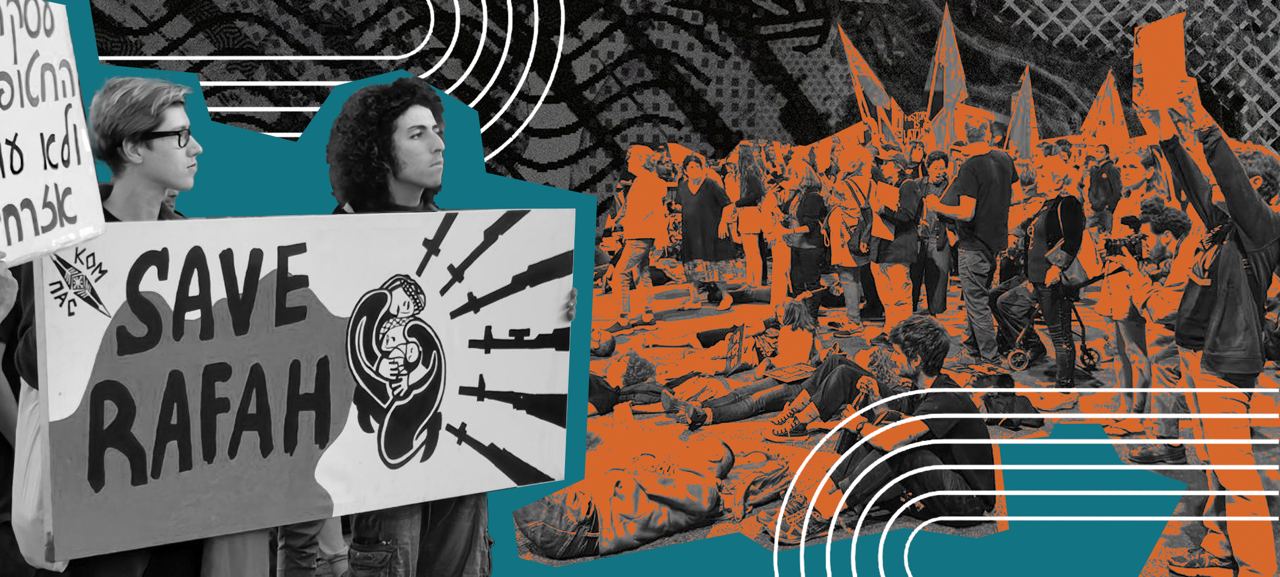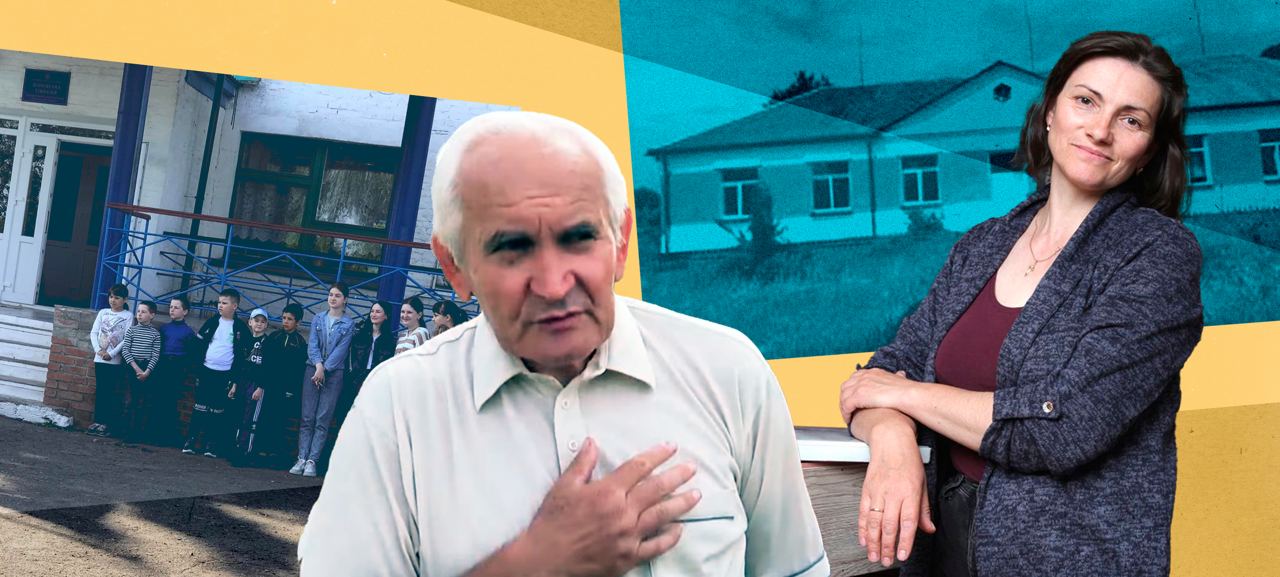Evheny Osievsky died on May 22 after a landmine flew into his trench and exploded. Although looking back at Zhenya’s activity on his Facebook page, it is hard to imagine he was so close to death. Five days before he died, he cheerfully posted his last interview with the British geneticist and science popularizer, Adam Rutherford. At the moment, everyone was surprised that a soldier of the Armed Forces of Ukraine had the time to do such journalistic work on a topic so far removed from the war. However, Zhenya had just spent almost a month away from the frontlines to recover from a concussion he had received during a combat mission in Bakhmut. He used this period to conduct the Rutherford interview, transcribe it by hand, translate and then retype it on his phone to submit it to his editor. He was lucky enough to have bought a smartphone the previous year, but knowing Zhenya, he would have typed out his text on his old push-button Nokia all the same.
Under any circumstances, he wrote, read, observed, interviewed, talked, and joked. The topics that caught Zhenya’s interest were very diverse: the anthropology of Melanesia; excursions into Kyiv’s religious communities; the popularization of science; and movie and comic book reviews. All of this was harmoniously combined in one individual who invariably maintained an ironic style, a critical view of our reality, and a solidarity with the oppressed.In memory of Zhenya, I want to briefly describe his main areas of research.
Zhenya and I have known each other since 2014 when we entered the same master’s program in political science. Over the course of a year, we became close friends, with numerous overlapping interests in the social sciences and culture. Over time we developed for ourselves a standard order of topics that we began the evening with and greeted the morning as we wandered across various bars and pubs of Kyiv’s Poldil neighbourhood. We began by debating different methodologies in the social sciences, and inevitably finished with a discussion of our shared “holy text” — Alan Moore’s comic book The Watchmen. Recalling the typical path of one of these nighttime pub crawls in Kyiv, here I would like to guide the reader through the creative achievements Zhenya left to us.

Evheny Osievsky. Photo from Facebook: Evheny Osievsky
Anthropologist
It was through political science Zhenya arrived at anthropology. He began his bachelor’s degree at the Volodymyr Vynnychenko Central Ukrainian State Pedagogical University by studying common topics that could seem boring to many people, such as the application of game theory to political processes. Zhenya was trying to build a model that could predict Viktor Yanukovych’s decisions as president. However, the model kept breaking against the hard forehead of the Party of Regions’ leader, who refused to behave as a rational actor according to the classical prescriptions of Game Theory. In the end, Zhenya was forced to defend his bachelor’s degree in methodology without a practical application.
For his master’s degree, Zhenya attended Kyiv-Mohyla Academy, where a wild array of courses could lead a person to both a promising job in the presidential administration and to endlessly digging through Frankfurt School texts. Zhenya avoided both extremes. He was lucky to have taken a course in political anthropology where he studied the field’s classics. He was delighted by what he read, although his classmates treated the course with disdain, offering up boring presentations of the texts they read and unenthusiastic discussions. Zhenya, by contrast, enthusiastically composed his reports with a burning desire to understand anthropology, which had inexplicably made its way into the schedule of a political science master’s.
Of all possible anthropological topics, Zhenya latched on to the strangest one: cargo cults. This term describes the practices of Pacific Islanders who imitate certain Western technologies or customs — such as creating a mock airplane or re-enacting military drills — in an effort to acquire Western goods. In everyday life, “cargo cult” has become offensive; it speaks of blindly following a practice without understanding how a desired result is achieved. Zhenya chose to study the famous cargo cult of John Frum on the island of Tanna in Vanuatu. John Frum is widely theorized to have been a mythical World War Two American soldier, or alternatively, a native islander who had contacts with Western civilization. Mainly based on the research and testimonies of others, Zhenya tried to consider the cargo cult from the perspective of political myth. Although the word “political” was used here more as a justification for his project within the Department of Political Science, the language Zhenya employed centred on Mircea Eliade’s and Emile Durkheim’s classical concepts of myth. In my opinion, as well as Zheny’s thesis reviewer, Ivan Gomza, it was a weak anthropological work because a true anthropologist must go into the field and analyze more deeply. Zhenya fully agreed with this.
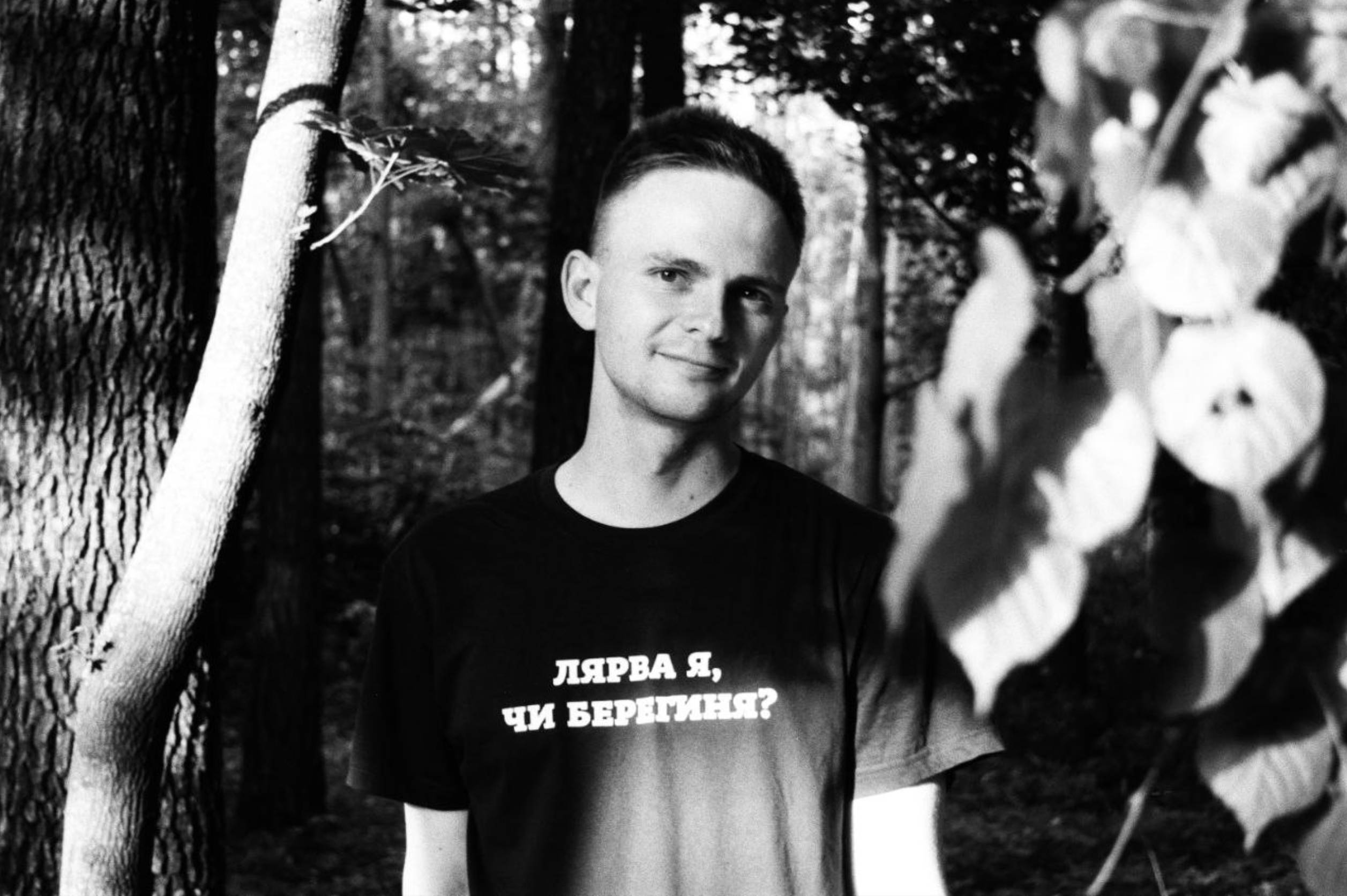
Evheny Osievsky. Photo from Facebook: Evheny Osievsky
However, such criticism did not discourage Zhenya, and he decided he would pursue a field study in graduate school for which he would not be ashamed. Zhenya did not want to go to a foreign university where there might be anthropologists working on Tanna Island or Melanesia in general. After all, he was already rooted in Kyiv through personal relationships and other projects and simply did not want to leave his native country. So, against all advice from his friends who did not want Zhenya to ruin his health, he decided to enroll at Kyiv-Mohyla, but this time in anthropology.
Despite everything, Zhenya was able to study the Bislama creole language of Tanna island, read anthropological works on Melanesia, correspond with other anthropologists, and save money for field research. At the beginning of 2020, Zhenya was ready to apply for a visa and prepare to travel to Tanna when the pandemic started and the borders were closed. At the end of 2021, Vanuatu began to allow foreign visitors again, so Zhenya planned his trip for March 2022 and received a study permit. But now the war fatally interfered with his plans.
However, during this whole time, Zhenya was not only saving up for his trip but writing a lot too. As in the case of his bachelor’s degree, when you don’t have access to the field, you write about methodology. Thus, Zhenya co-authored his first academic peer-reviewed article with the political scientist Maksym Yakovliev on the theoretical intersection of Michel Foucault’s and the economist George Ainslie’s seemingly disparate approaches to subjectivity. Although the pandemic had closed borders, it in turn opened up space for online conferences. In 2021, Zhenya was invited to a conference of ethnobiologists, for which he was able to scrape together a small study on the Tanna people’s use of the cycas plant. Zhenya’s second peer-reviewed article based on this report is due to be published in the Journal of Ethnobiology in late 2023. And if I and a few others succeed, then Zhenya’s third peer-reviewed paper will be subsequently published on the methodology of anthropological field research. At the same time, Zhenya discovered a wealth of anthropological material outside his academic research.
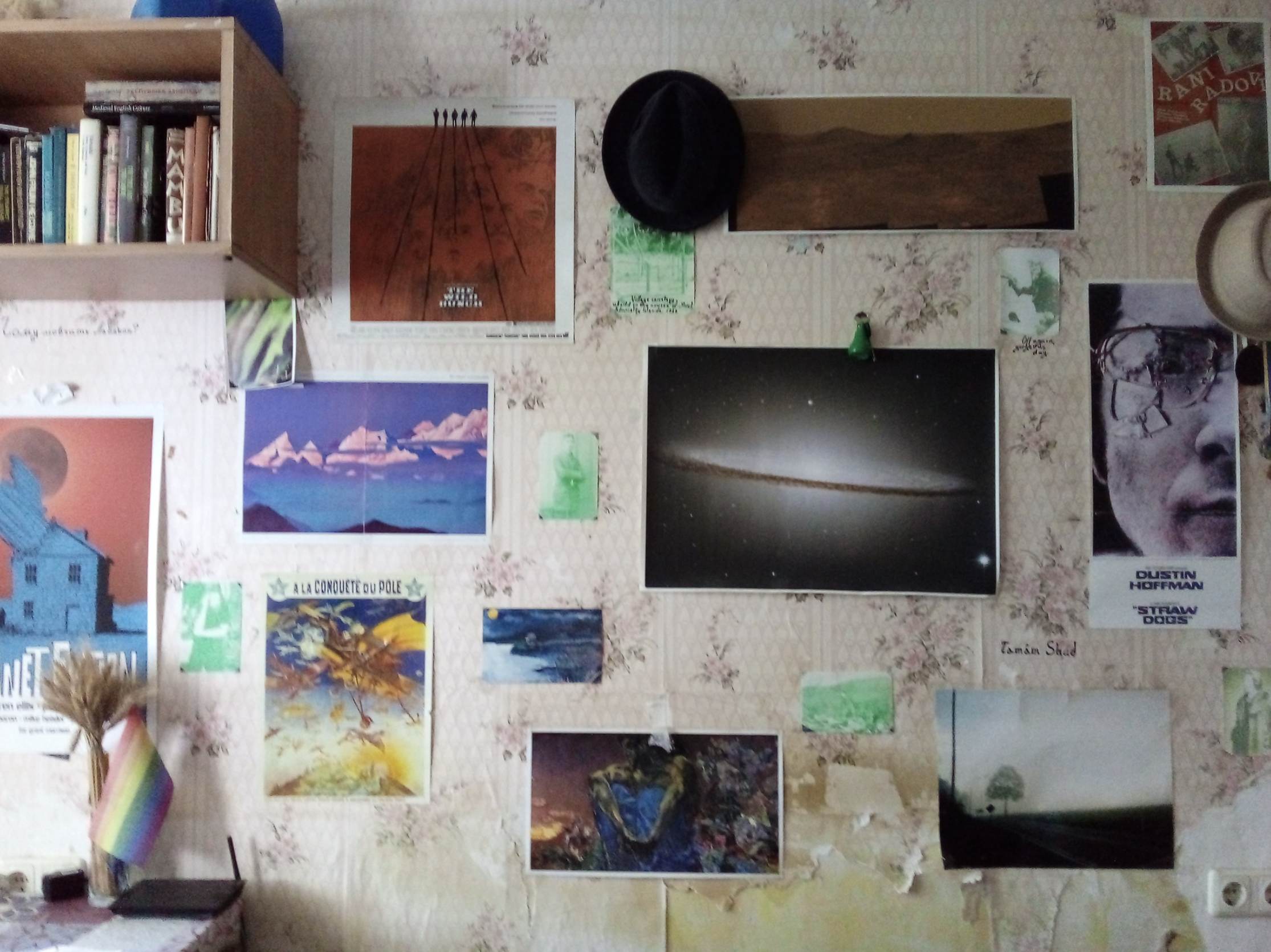
Zhenya Osievsky's room. Photo from Facebook: Evheny Osievsky
Gonzo-Anthropologist
Zhenya created his own genre of writing at the intersection of gonzo-journalism and anthropology, which can be labelled: gonzo-anthropology. He was an ardent atheist, but the goal of his research was not to expose religion as a type of false consciousness or “backwardness.” Rather, Zhenya sought to understand people’s religiosity in its strangest manifestations. To do so, he began visiting religious communities in Kyiv and writing reports about them for Spilne.
The first such outing was to one of Volodymyr Muntyan’s “Regeneration” church’s prayer services. It seemed like an easy target for criticism given the church’s manner of extracting money from people. And while true, Zhenya went further by drawing parallels between Muntyan’s marginal church and more acceptable organizations like Apple or events like a Viktor Pavlik concert (although this comparison was also made for comedic effect). Here the reader finds an ironic description of Muntyan’s prayer service alongside a critical take on modern society and capitalism.
In subsequent reports, appearing once or twice a year, Zhenya continued with the idea that organizations that ordinary people might disparagingly call “sects” and laugh at as fringe, in reality, demonstrate central structural elements of late capitalist society in Ukraine. Such communities were often separated from society and Zhenya had to invest his own funds and resources in order to get inside them. The most extreme case for Zhenya was his report on the Church of Scientology, whose secret knowledge he could not uncover with his own hands and therefore had to rely on what was publicly known about its theology. However, his reportage was above all about the relationships within these strange communities and how, in reality, they are much more familiar to us than we imagine. In this way, Scientologists with their bizarre belief in cosmic warfare come to resemble Christians, while fortune tellers and magicians either say they are really only psychologists or refuse up to the last moment to admit that they do not use magic spells but actually basic techniques for “reading” customers that can be found in any regular store.
Over time, Zhenya began to gravitate towards the reporting aspect of his gonzo-anthropology, leaving conclusions more to his readers’ discretion. But, as is befitting to a faithful follower of Hunter S. Thompson, Zhenya maintained an ironic and sharp writing style that emphasized his critical nature. The anthropological part of his writing always humanized the adherents of various religious practices. Ultimately, Zhenya’s later texts are more reminiscent of journalistic reporting than anthropological digs in search of explanations for why and how people join religious movements or turn to esoteric practices. The last such report from the prayer stand near the Verkhovna Rada consists mainly of direct quotes from those standing guard at the cross. While Zhenya mocks the cross’s ability to cure the coronavirus, at the same time, he is sympathetic towards those who turn to it.
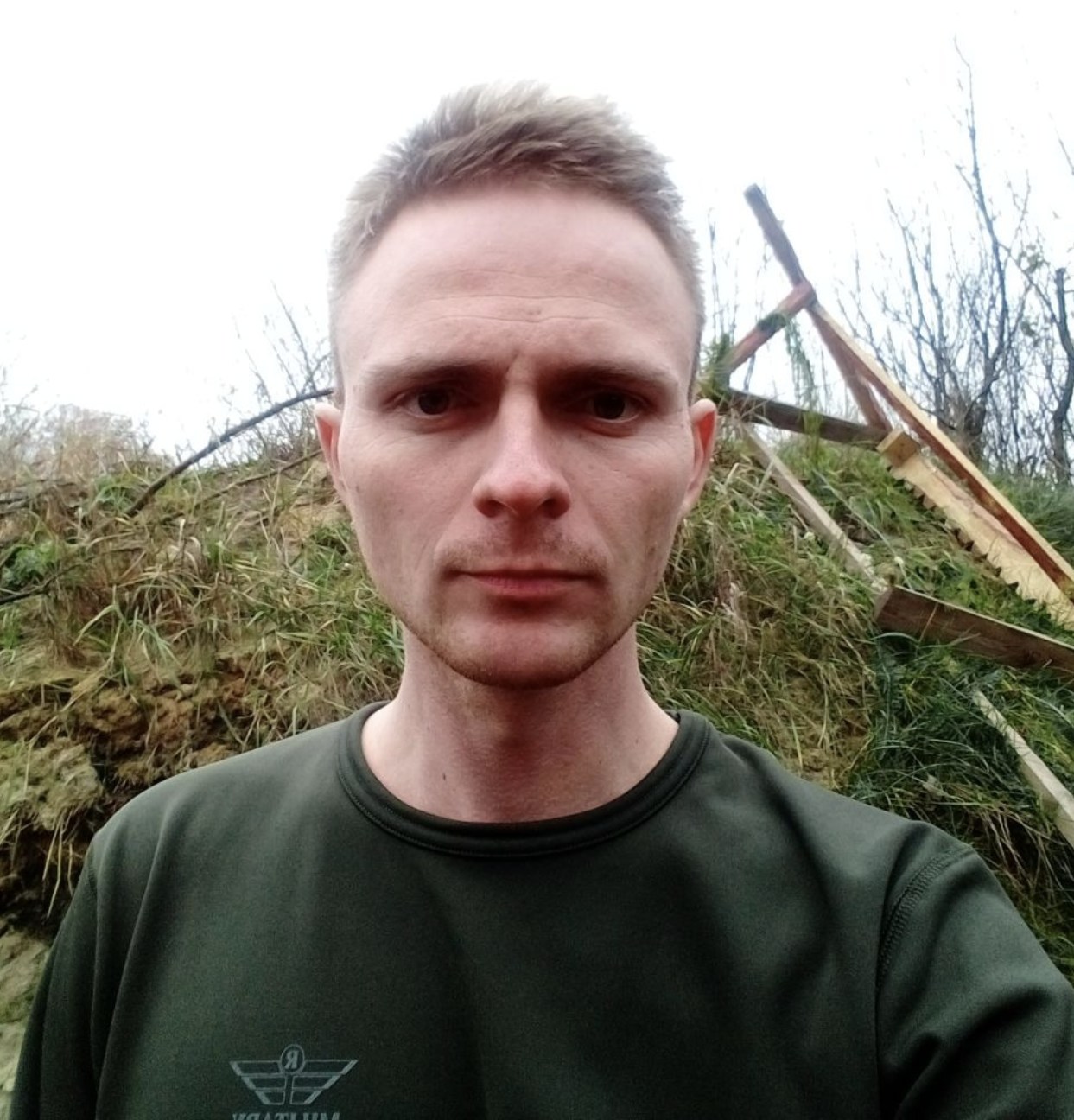
Zhenya Osievsky in the Armed Forces. Photo from Facebook: Evheny Osievsky
Science Popularizer
Before finding himself in gonzo-anthropology, Zhenya had experience in regional journalism. While still in his hometown of Kropyvnytskyi, he began writing about cinema and science for local publications. From the very start of his journalistic work, Zhenya sought topics that might not only interest readers in something strange but also challenge the basic ideas of the world around them.
So it was that the popular-science media outlet Kunsht became Zhenya’s main venue after Spilne for publishing his material. At first, his pieces touched on the intersection between politics and popular science. He wrote about the organization of hunger strikes and the exploitation of workers in the Global South to make iPhones. Later, however, Zhenya found his niche in unusual natural phenomena such as birds who set fire to fields, or in the quirkiness of the scientific process itself, where even a dog can become the author of scientific articles that colleagues will actively cite. These articles were published in Kunsht’s BizarroScience section, named after Superman’s offbeat enemy, Bizarro, who as the product of a failed scientific experiment acquired powers opposite to Superman. In the section, comic book references were combined with humorous illustrations of articles.
There was less politics in these texts. However, at times Zhenya’s transhumanism made its way through. He was a vegetarian and believed that humans have no right to harm animals, so he refused to eat creatures with a developed central nervous system (he did, however, eat mussels and made a delicious salad from them). Therefore his article about the dog who became a scientific author is not only about a joke about how the biologist Polly Matzinger adopted her pet as a co-author but also about how pets can contribute to human work and deserve recognition and respect. Similarly, the article about fire-wielding birds questions the notion that the use of fire is a product of human genius. Instead, it may simply be a technique our ancestors acquired from bird-watching. For Zhenya, humans were not the crowning jewel of God’s or nature’s creation — a creature often full of conceit and harmful to the environment when not treating animals with due respect.
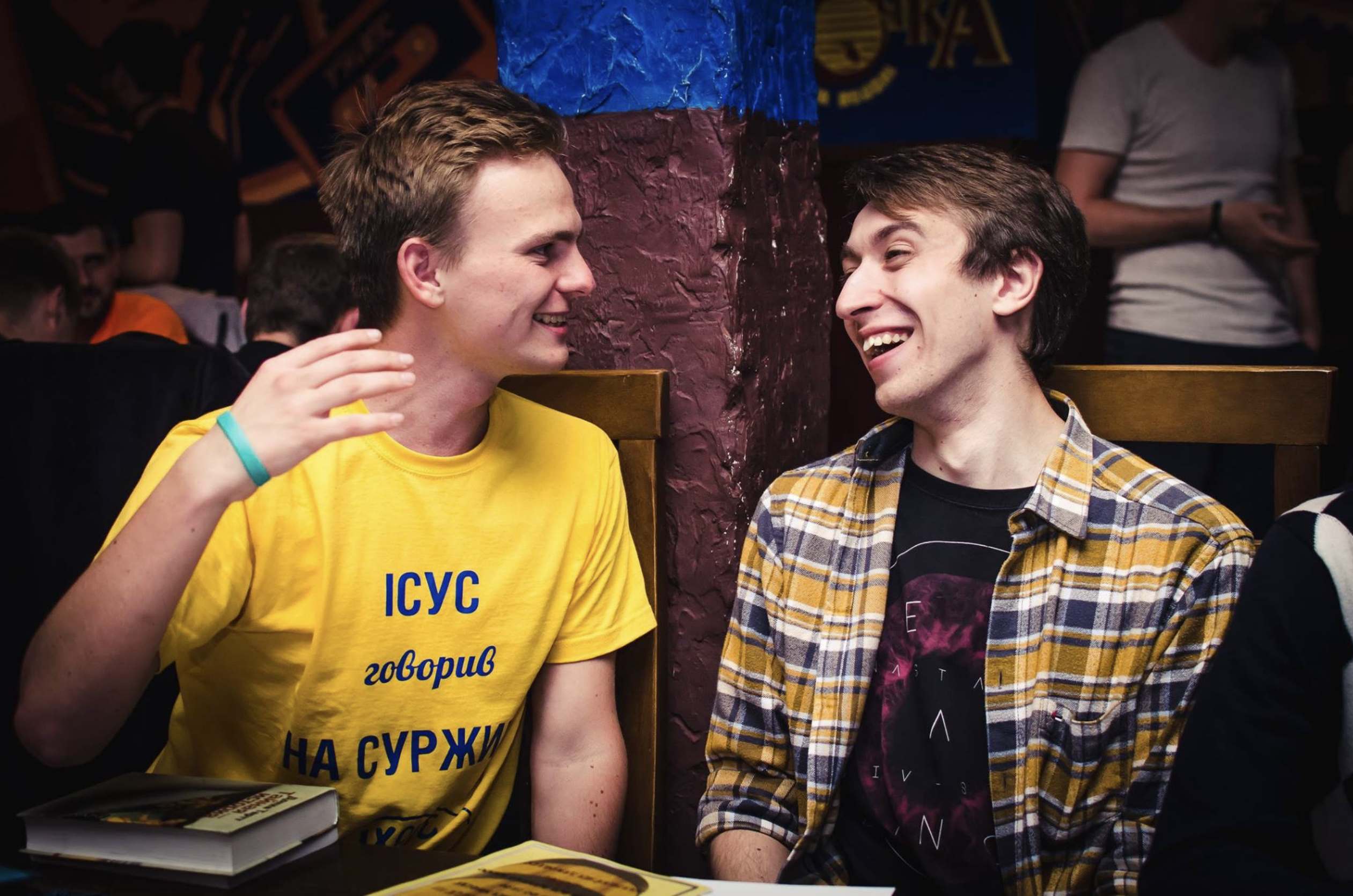
Zhenya Osievsky and Yaroslav Kovalchuk. Photo from Facebook
Film and Comic Critic
Zhenya wrote a lot about cinema, but it is difficult to identify a single medium. Sometimes these were not simply reviews of new films but also interviews with directors he tried to squeeze in during film festivals. I watched as Zhenya struggled all day to speak with Peter Greenaway fighting his way through the Molodist’ festival’s organizers and journalists from more respectable publications. Unfortunately, the 15-20 minutes Zhenya managed to win for himself did not become material for any Ukrainian publication. Nonetheless, he remained undeterred and took up a new text. He regularly published film reviews, interviews, and articles for Bird in Flight and Yabl, as Zhenya constantly went to the movie theatres and festivals allowed for more in-depth research.
During the festival off-season, Zhenya enjoyed searching for old cinemas in Kyiv’s remote corners, combining film screenings with excursions to what remains of Soviet architecture. In desperation, he was forced to go to shopping and entertainment centers. Although there was one shopping mall theatre that Zhenya loved. The Multiplex in “Lavyna” shopping centre had a room dedicated to Ryan Gosling and a restroom that reminded at least Zhenya and me of the one in Stanley Kubrick’s The Shining. It is a rare case that a shopping mall movie theatre has a personality of its own of the type Zhenya so appreciated in the old Soviet cinemas.
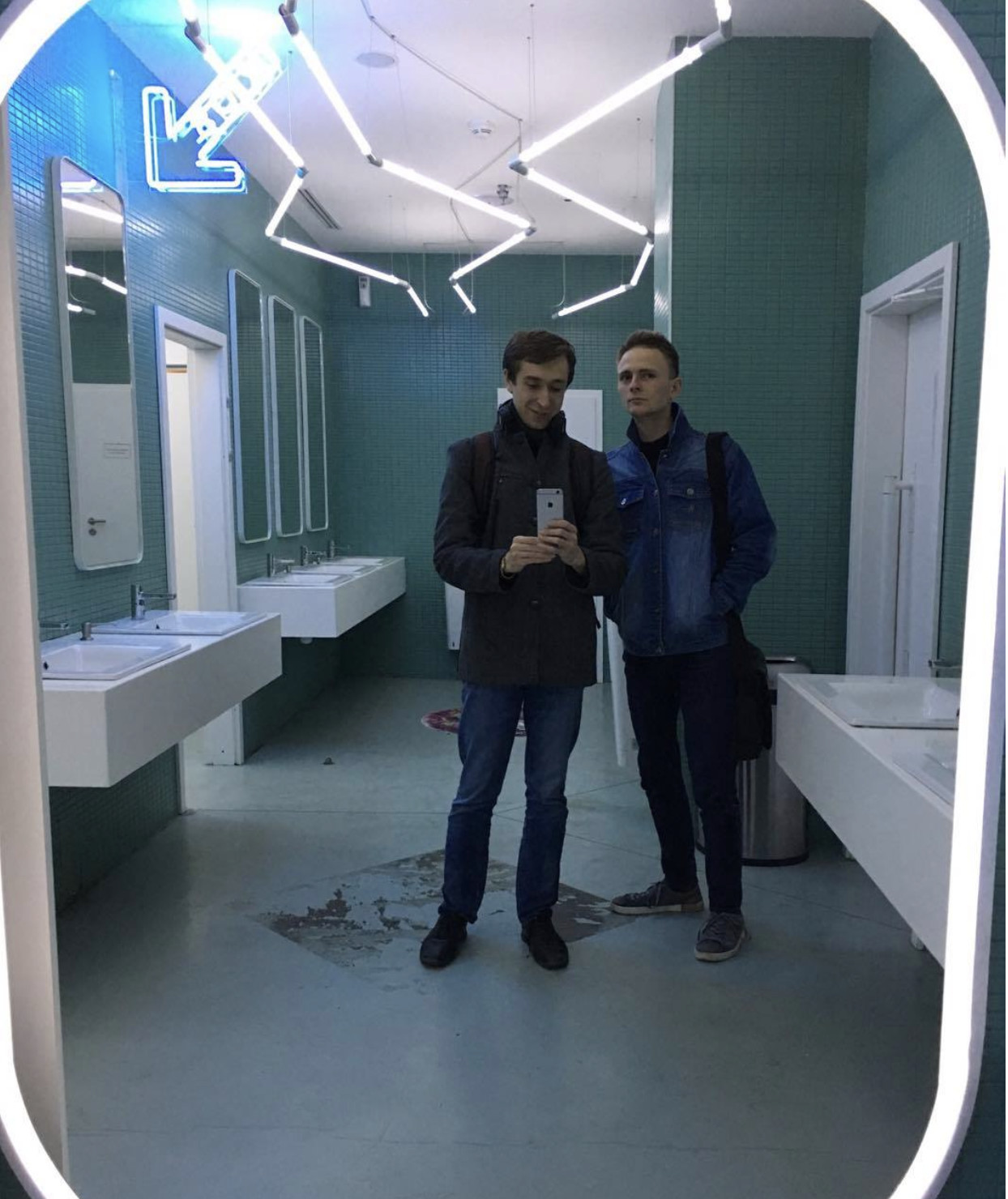
Yaroslav Kovalchuk and Zhenya Osievsky in the dressing room of the "Lavyna" shopping mall
Zhenya also had one important moment when viewing films: he always watched the credits to the end and would become very upset if they were turned off. And no, it had nothing to do with Zhenya’s love of the Marvel Cinematic Universe. He was less interested in the names of everyone who worked on a film than he was in the credits’ role as an artistic medium in their own right. He even delivered an entire lecture on this topic at Kyiv’s Comic-Con. For example, when speaking about Sam Peckinpah’s Cross of Iron — one of Zhenya’s favourite films — he argued that without the final quote by Bertolt Brecht, it could be perceived as romanticizing the Wehrmacht. Therefore, Zhenya urged movie watchers to sit through the end credits so as not to miss anything important.
Zhenya went to comic conventions primarily for comics, not movies. He collected traditional American superhero comics as well as more niche ones, such as the science fiction of Argentine Héctor Germán Oesterheld or rare examples of female-created manga by Kuniko Tsurita. But at the heart of his passion was the “British invasion” of American superhero comics, of whom Alan Moore was the most famous author. Zhenya even almost managed to interview on the 30th anniversary of Moore’s V for Vendetta. However, Moore refused to talk about his old works and simply declined the interview via email. After that, Zhenya often joked that he had spoken with Alan Moore himself and that this was the pinnacle of his career as a journalist. Instead, he managed to get a wonderful interview with David Lloyd, the artist for V for Vendetta. He also wrote material about the Guy Fawkes mask, which first appeared in this comic.
Unfortunately, Zhenya did not manage to write as much about comics as he did about cinema and science. However, despite the war, in 2022 he successfully published two pieces for the leading American comic book journal, quite unoriginally named The Comics Journal (TCJ). In a short text before Zhenya’s death, TCJ editor Joe McCulloch spoke about ideas for further collaboration which remained unfulfilled. Nonetheless, Zhenya managed to introduce Western readers to Oleksandr Grekhov and the Ukrainian artistic context.
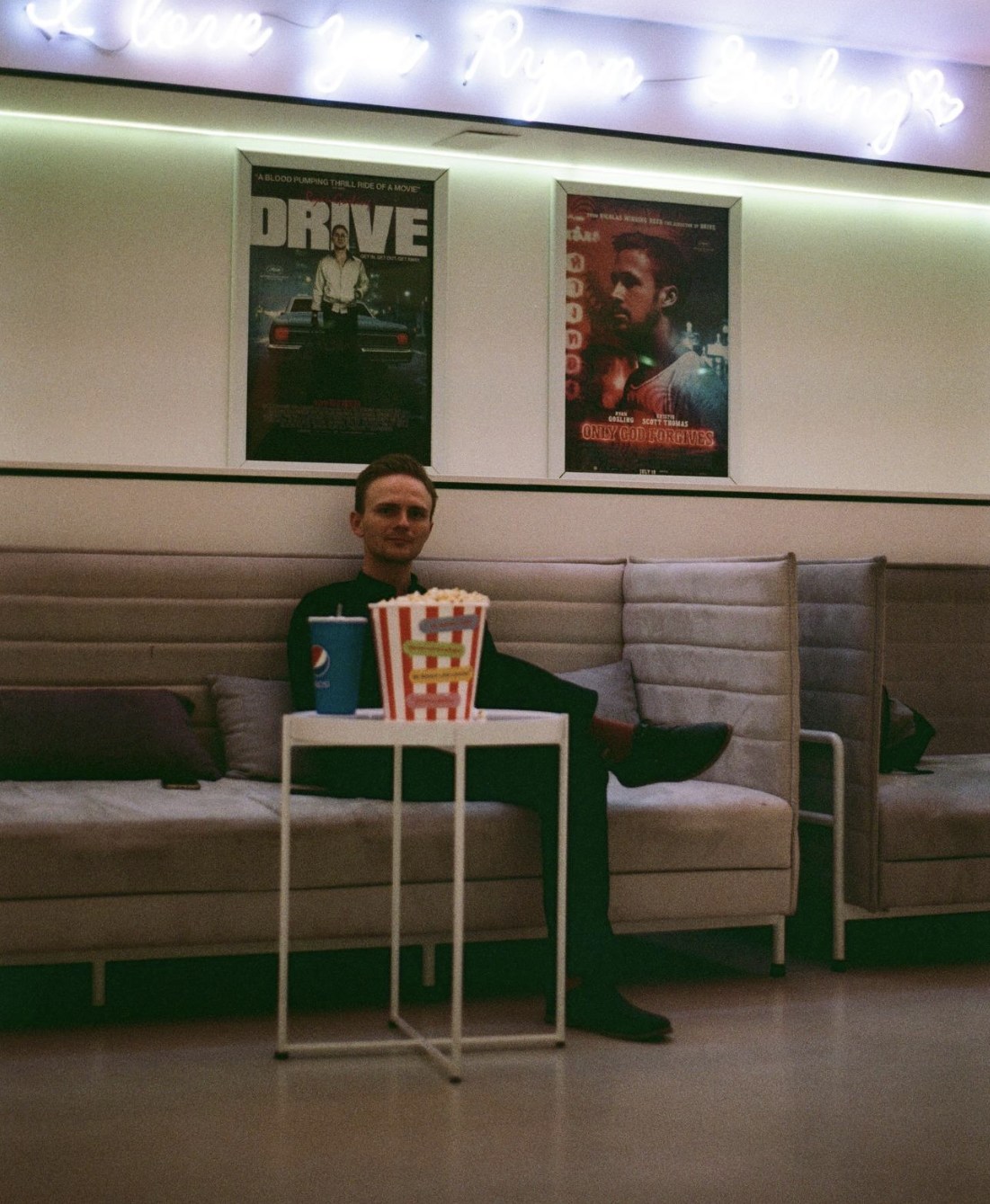
Zhenya Osievsky in the cinema. Photo from Facebook: Evheny Osievsky
Zhenya’s debut work in TCJ was impressive. It was an analysis of nuclear war in a comic book that had already been analyzed from hundreds of different angles. In fact, this was one of Zhenya’s favourite comic books. Here we are talking about Alan Moore’s most famous work The Watchmen which imagines a 1980s United States in which superheroes have helped America win the Vietnam War and re-elect Nixon for a third term. However, tensions remain between the USA and USSR and events in The Watchmen unfold against the background another escalation between the two superpowers. In his article, Zhenya points to different aspects of the fear around nuclear war from this era, in the end emphasizing that these fears are once more relevant for American readers, Ukrainians, and indeed any inhabitant of Earth. In private conversations, Zhenya said that he expected Russia to launch not just one nuclear strike to frighten Ukraine and force its surrender but a flurry of nuclear warheads on Ukraine’s major cities and the concentrated areas of the Armed Forces of Ukraine to definitively destroy Ukrainian resistance. Fortunately, such pessimistic expectations have not yet come to pass, but Zhenya believed that everything needed to be done to stop Russian aggression.
Left Libertarian Soldier
Here we arrive at Zhenya’s views and actions. I have known him since 2014 when he entered Kyiv-Mohyla Academy. Even before then, he was a person of left-wing beliefs, a feminist, and a transhumanist, which readers may have already noticed from the texts mentioned above. He told that he adopted left-wing views after reading Louis Althusser’s works. One of Zhenya’s main credos was “it is forbidden to forbid” and he clearly gravitated towards anarchist thought. This can be linked to his choice in favour of anthropology, which always takes a grassroots perspective on how human life is organized. Already at the front, Zhenya felt he might be close to the Makhno movement, so he asked me to send a book to him in the Donbas about Makhno and his movement. Among Ukrainian political organizations, he was closest to “Sotsial’nyi rukh” [Social Movement], whose rallies he frequently joined. He also tried not to miss Kyiv Pride Days or International Women’s Day rallies, which he would go to by himself, in the company of friends, or with Social Movement activists.

Zhenya Osievsky (right) with the activists of the "Sotsialnyi Rukh". Photo from Facebook: Sotsialnyi Rukh
It was to be expected that when the war began, Zhenya could not sit idly by. Initially, he planned to enlist in the Territorial Defense Forces. However, this plan fell through when Zhenya decided to pick up his cats in Vorzel’ but could not return to Kyiv. After two weeks under occupation, Zhenya was evacuated and immediately went to the Kropyvnyvskyi Territorial Recruitment Centre, where he was told he could be of more use away from the front. Zhenya then started looking for ways to become a war correspondent. From these plans to be a useful journalist during the war, he realized one interview with a sniper about his experiences and another with the anthropologist Hugh Gusterson on nuclear weapons. However, Zhenya felt he was contributing little.
Then in early November, Zhenya received a call from the Kropyvnytskyi Territorial Recruitment Centre informing him that he was needed, and he immediately went to pack his things. In this way, Zhenya ended up in the 77th Air Assault Brigade. One month of training in Britain, a few more in Ukraine and by late February he was sent on his first combat mission near Bakhmut. From his brothers-in-arms, he received the call sign Vegan, but fellows from another platoon called him Movie Critic. Zhenya was a rifleman-medic and he said that he managed to provide first aid and save soldiers’ lives. He believed that he was fulfilling his duty to protect. However, Zhenya never had any hatred toward Russians. For example, after the death of Dmitry Petrov, a Russian anarchist anthropologist and volunteer for the Ukrainian Armed Forces, Zhenya wrote: “Ukraine will win, and Russia will be free.” In his last call to his mother on May 21, he said that wanted wars to end and wished that no one in the whole universe would ever be killed based on nationality or any other grounds.
In our last conversation on May 17, he described to me in detail his last combat mission in Bakhmut. He also shared his plans for the future about publishing comic books and still getting to Vanuatu. I want to believe that after death, anthropologists return to their field and that Zhenya ended up on the island of Tanna. Zhenya’s comic book and several other texts of his are planned for publication if not this year then the next.
Author: Yaroslav Kovalchuk
Translated by Sean Patterson
Cover: Kateryna Gritseva
Translated into Italian: Refrattario e Controcorrente


